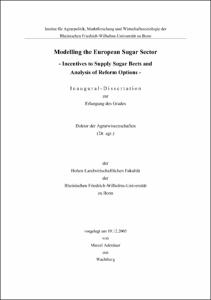Adenäuer, Marcel: Modelling the European Sugar Sector : Incentives to Supply Sugar Beets and Analysis of Reform Options. - Bonn, 2006. - Dissertation, Rheinische Friedrich-Wilhelms-Universität Bonn.
Online-Ausgabe in bonndoc: https://nbn-resolving.org/urn:nbn:de:hbz:5N-07592
Online-Ausgabe in bonndoc: https://nbn-resolving.org/urn:nbn:de:hbz:5N-07592
@phdthesis{handle:20.500.11811/2364,
urn: https://nbn-resolving.org/urn:nbn:de:hbz:5N-07592,
author = {{Marcel Adenäuer}},
title = {Modelling the European Sugar Sector : Incentives to Supply Sugar Beets and Analysis of Reform Options},
school = {Rheinische Friedrich-Wilhelms-Universität Bonn},
year = 2006,
note = {The Common Market Organisation for sugar of the European Union has withstood major reform of any kind over the last three decades while other agricultural markets have been subject to far reaching reforms. Today, this ‘invulnerability’ is over. Reform pressure occurs from many sides. The sugar using industry objects to having to pay prices that lie three times above world market levels for European sugar, and recent global developments have made a reform of the European sugar market inevitable. (1) The Everything but Arms concession granting the Least Developed Countries a quota and duty-free access for all goods but arms into the EU including sugar as of 2009 makes a high-level of sugar imports from these countries likely. (2) Brazil, Australia and Thailand filed complaints against the European Union, arguing that C-sugar exports and re exports of imported sugar have to be considered subsidised exports so that the current quantity limit of 1.3 million tons of subsidised exports is overshot by about 3 million tons. Since the EU lost the following WTO panel, sugar exports are to be reduced considerably in future. Consequently, European sugar production must also be significantly reduced.
This study analyses the impacts that a reform of the European sugar sector may have on European farmers. Since such an analysis is only possible if the observed supply behaviour in the past can be explained, this aspect is analysed first. Particular emphasis is given to the question, why European farmers supply sugar quantities considerably beyond their quota endowments for which only world market prices are paid. A number of behavioural hypotheses are introduced and evaluated using data from national statistics, farm data and own estimates of marginal production costs and of single farm quotas. The results from this analysis are then used to modify the agricultural sector model CAPRI with which possible reform options are evaluated. These adjustments help to analyse the supply response of European farmers to changes in the political environment of the sugar sector compared to other model approaches.},
url = {https://hdl.handle.net/20.500.11811/2364}
}
urn: https://nbn-resolving.org/urn:nbn:de:hbz:5N-07592,
author = {{Marcel Adenäuer}},
title = {Modelling the European Sugar Sector : Incentives to Supply Sugar Beets and Analysis of Reform Options},
school = {Rheinische Friedrich-Wilhelms-Universität Bonn},
year = 2006,
note = {The Common Market Organisation for sugar of the European Union has withstood major reform of any kind over the last three decades while other agricultural markets have been subject to far reaching reforms. Today, this ‘invulnerability’ is over. Reform pressure occurs from many sides. The sugar using industry objects to having to pay prices that lie three times above world market levels for European sugar, and recent global developments have made a reform of the European sugar market inevitable. (1) The Everything but Arms concession granting the Least Developed Countries a quota and duty-free access for all goods but arms into the EU including sugar as of 2009 makes a high-level of sugar imports from these countries likely. (2) Brazil, Australia and Thailand filed complaints against the European Union, arguing that C-sugar exports and re exports of imported sugar have to be considered subsidised exports so that the current quantity limit of 1.3 million tons of subsidised exports is overshot by about 3 million tons. Since the EU lost the following WTO panel, sugar exports are to be reduced considerably in future. Consequently, European sugar production must also be significantly reduced.
This study analyses the impacts that a reform of the European sugar sector may have on European farmers. Since such an analysis is only possible if the observed supply behaviour in the past can be explained, this aspect is analysed first. Particular emphasis is given to the question, why European farmers supply sugar quantities considerably beyond their quota endowments for which only world market prices are paid. A number of behavioural hypotheses are introduced and evaluated using data from national statistics, farm data and own estimates of marginal production costs and of single farm quotas. The results from this analysis are then used to modify the agricultural sector model CAPRI with which possible reform options are evaluated. These adjustments help to analyse the supply response of European farmers to changes in the political environment of the sugar sector compared to other model approaches.},
url = {https://hdl.handle.net/20.500.11811/2364}
}






